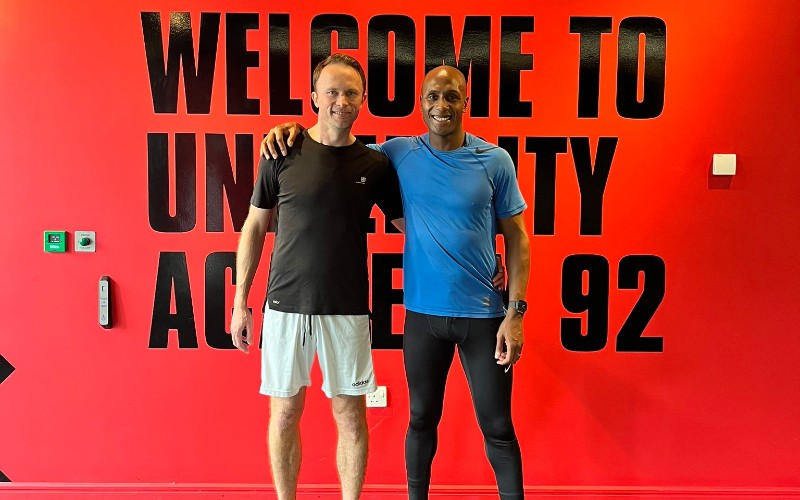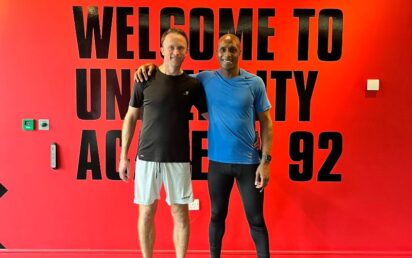As far as locations go, you can’t get much better than that of University Academy 92.
The university – founded just five years ago by Lancaster University and Manchester United’s famed Class of 92 football stars – is situated a stone’s throw from the Theatre of Dreams.
Directly next door to the other Old Trafford – Test venue and home of Lancashire Cricket Club – the sparkling campus also plays host to a base for Microsoft, one of more than 70 industry partners which help to shape its curriculums for students.
“Our employers have been legendary in helping us frame and set out what the needs of industry are,” director of disruptive learning Aaron Saxton (pictured, right, with Jonathan Symcox) tells BusinessCloud of a higher education institution focused on core subject areas sport, media, digital and business.
“We are working with KPMG, JD Sports, Manchester United, The Hut Group, Amazon Web Services, CompTIA, Microsoft, Disney Streaming, TalkTalk – some of the biggest organisations globally who have the largest workforces on the planet, and biggest needs in tech in particular.
“They help us write our curriculum, deliver insights, masterclasses: Disney Streaming [for example] is delivering a workshop on cloud alongside the idea of Disney Streaming as a cloud platform.”
Neighbour Lancashire Cricket has been a partner from the start. Coaches at the Manchester United Foundation have also delivered coaching sessions for students.
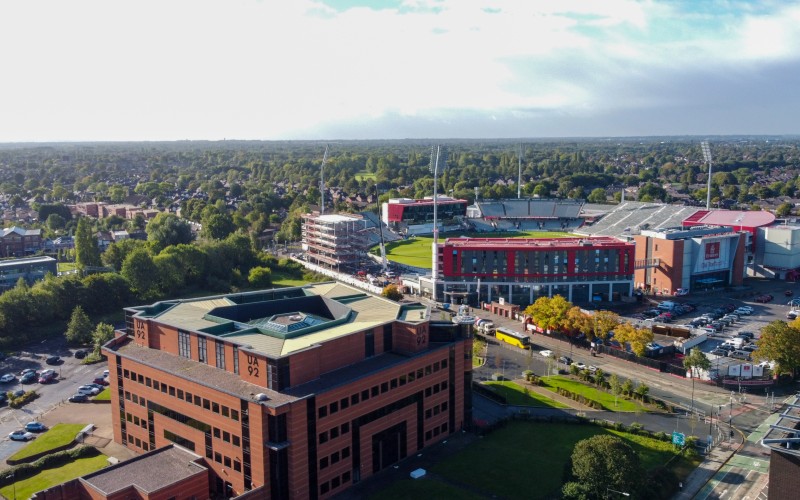
Old Trafford, in background, and UA92
Disadvantaged & marginalised
UA92, which for now awards degrees from Lancaster University, was described by The Times as “a venture setting out to help disadvantaged young people in Manchester get a better education… explicitly drawing on the strategies and mindset of elite sport”.
“We deliberately and boldly target the most disadvantaged and marginalised communities: for example Wythenshawe, Hulme, Moss Side, Partington, Wigan,” Saxton explains.
“We have an outreach team with roots in these communities – I grew up in Moss Side myself – who do a lot of connection at that level to get under the skin and into those communities and bring them here. We run events, bring the kids on site, feed and get them used to campus, host church events. We want to deliberately differentiate ourselves from those universities in the city centre that don’t necessarily serve those communities.
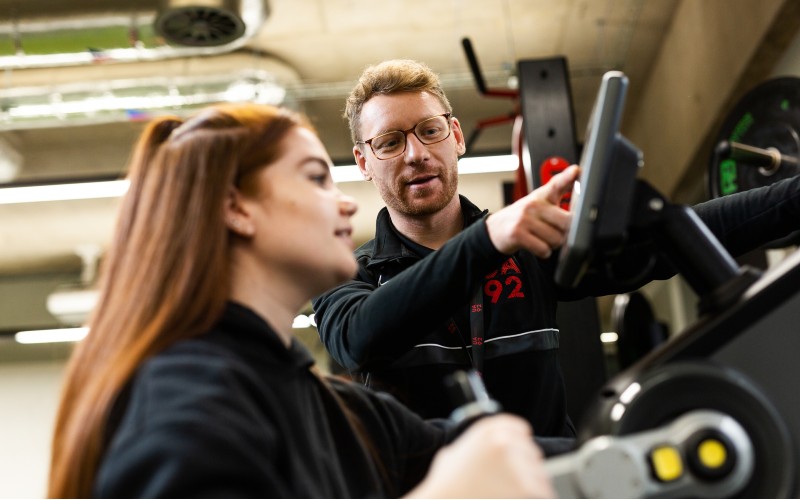
Dr Anthony Gorman with UA92 student
“In a lot of these communities, they’re struggling to heat and eat, live and survive. These kids may be from single-parent backgrounds: so how do we raise their confidence and trust that we will help them?
“We give them the realisation and belief that they really can work with these huge organisations… that’s massive! For a student to come in here with a Microsoft HQ on campus, it’s within touching distance for them.
“They then believe: ‘I can work for Microsoft. I could possibly work for Disney Streaming. How do I know? I’ve met their lead principal engineer.’”
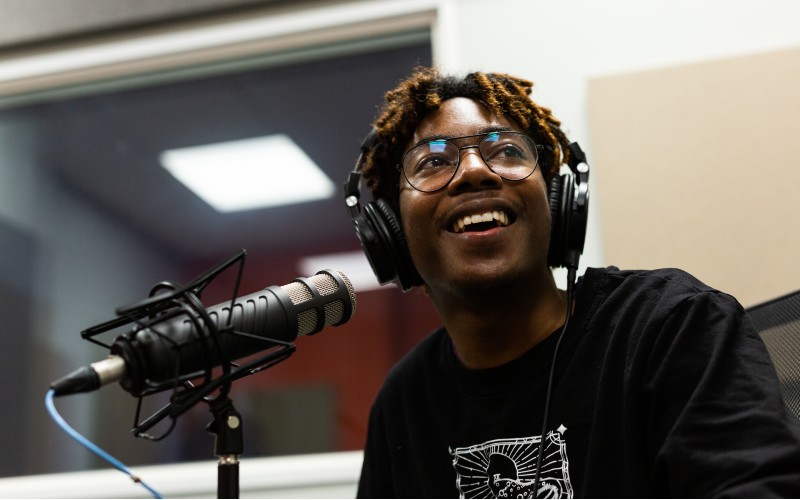
The end of the harvest
An approach that stands UA92 apart from traditional universities are its multiple entry points in the year: September, November, January, February, April and June.
“The reason we start school in September is from the harvest days – it’s centuries old! The kids were needed to bring in the harvest, and once that was done, they started school. It’s insane! Why haven’t we changed that?
“In life you might start a family early; you might lose a job; COVID happened… starting an academic year in September does not serve the modern lifestyle.
“So we have six entry points in the year which enable anybody to join within a few weeks of their situation changing and access education and continue to be inspired by what we’re offering.”
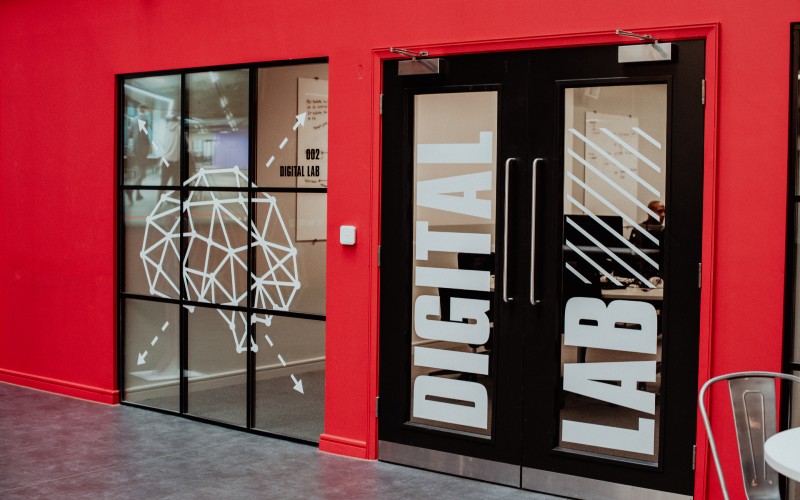
Enabled by cutting-edge technology, its approach to teaching also feels revolutionary. “How do we deliberately utilise innovative methods to shake up the traditional academic model?” asks Saxton.
“We integrate forms of learning through Web3, the metaverse, AI, data analytics, DevOps, Linux, cloud computing – these mediums allow us to deliver truly global education to meet the needs of modern society.”
Its Igloo Vision 360-degree immersive space, for example, “immerses our students in what a business, a scenario, a technology, a problem, a human body, a cardiovascular system looks like… immerse them, see it, engage”.
Metaverse
And in what UA92 calls a first for higher education, its newly launched metaverse – built with international agency DigiSomni and its Vircadia open source platform – provides unique NFT achievement awards.
The aim is to open its campus to global audiences and better serve international and remote students. With a vision for autonomous learning and AI, it provides lectures, presentations, character and personal development advice zones, wellbeing activities, campus tours and events on the virtual platform, with each student given access through individual avatars, allowing them to meet, learn, chat and socialise.
Saxton adds: “Even launching our metaverse in the Igloo is incredible because students can stand in there and be in the metaverse with global students [rather than watch it on a computer screen].”
A sport performance hub – which brings back memories of my Sport & Exercise Science undergraduate days – is among the best available for the study of scientific disciplines such as biometrics.
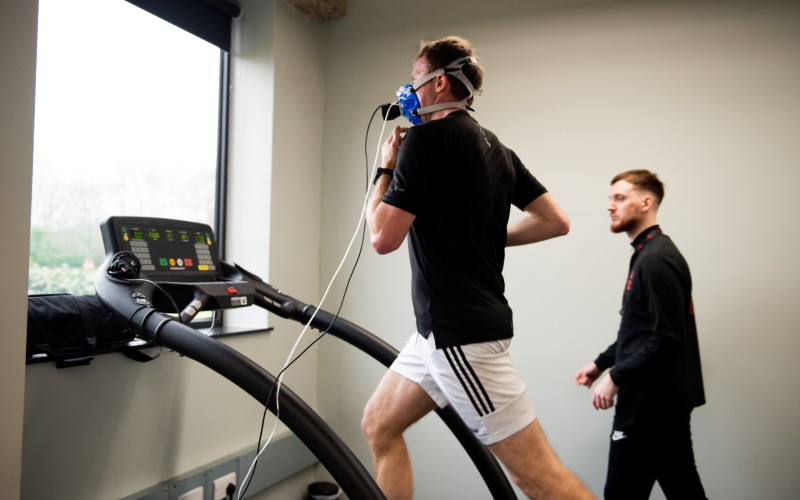
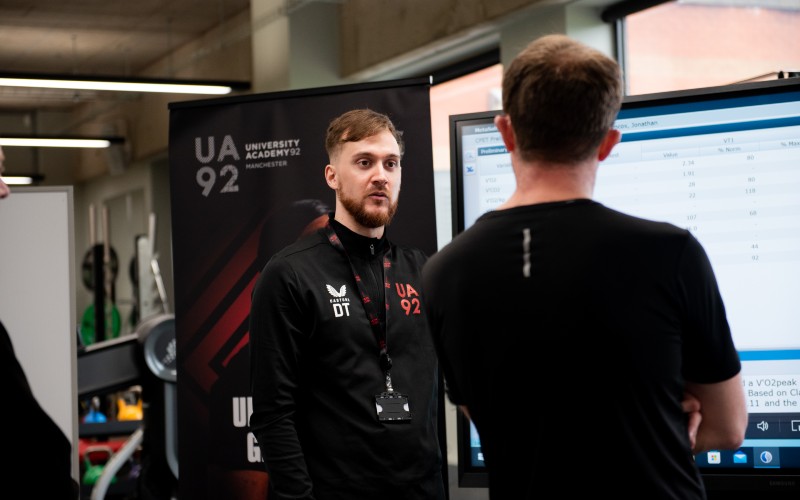
Jonathan Symcox undergoes Vo2 Max test at UA92
Tip of the iceberg
Life itself, however, is not a perfect science, says Saxton. “We need to move away from formulas and frameworks. I’m sick to death, to be honest with you, of people thinking there’s a utopia of how people get to where they are – this ‘tip of the iceberg’ sort of viewpoint that people have of life. Because that isn’t it – all that s*** below the surface is what takes you there.
“We are fully focused on transferable skills. How do you really truly build confidence and resilience? You need to help people feel uncomfortable, but in a safe environment – whether it be in sport, public speaking, networking.
“We’ve got to create a space for failure – the most powerful asset for growth. We’ve created a society where failure is deemed as bad and negative. In the nicest possible way, people like you and me have had great parents and role models, a lovely upbringing – but a lot of our students haven’t had any of that wraparound care.
“So we’re using tech and this environment to create those safety nets or bubbles where failure is good. We celebrate it: learning from failure is the most important thing. Use it to push yourself.”
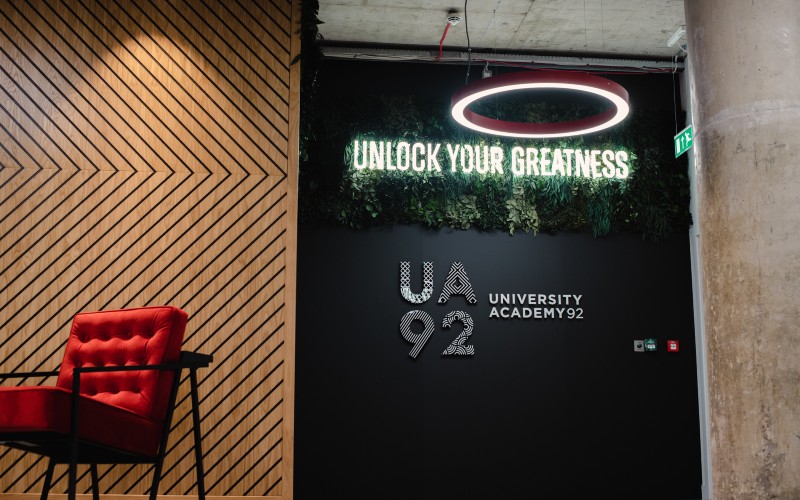
Sir Alex… the Jedi master!
In conclusion, Saxton cites the story of one of UA92’s founders – Manchester United and England legend Gary Neville – likening former United boss Sir Alex Ferguson to a Jedi Master.
“The hero’s journey in Greek mythology is a formula developed thousands of years ago: look at Luke Skywalker in Star Wars, Harry Potter; is there any difference between Voldemort and Darth Vader? It’s the same story, same characters!
“What we’re creating here is that hero’s journey: we watch these films, these books, these stories of people who have succeeded in business, in sport. You don’t get to where Gary Neville is without adversity, without coming to know yourself, without the direction of a guide like Sir Alex Ferguson.
“I’m a massive believer that technology is the biggest accelerator and disrupter in inspiring people and supporting people, and creating those careers and opportunities.”

